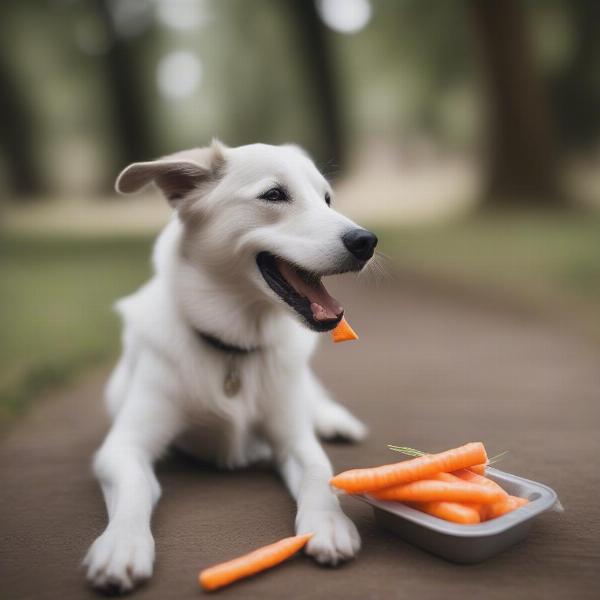Footlong hot dogs, a popular street food and barbecue staple, may seem like a tempting treat to share with your furry friend. However, it’s important to understand the potential risks and make informed decisions about your dog’s diet. This article will explore the dangers of feeding your dog a footlong hot dog and offer healthier alternatives to keep your canine companion happy and safe.
The Dangers of Footlong Hot Dogs for Dogs
While a small piece of plain, cooked hot dog might not cause immediate harm, footlong hot dogs present several risks to your dog’s health. The sheer size and high sodium content are the primary concerns. These oversized treats are packed with salt, which can lead to dehydration, electrolyte imbalances, and even sodium ion poisoning in dogs.
Furthermore, many hot dogs contain added seasonings, preservatives, and other ingredients that are toxic to dogs, such as onion and garlic powder. The high fat content can also contribute to pancreatitis, a serious and potentially life-threatening condition. Even the casing itself can pose a choking hazard or cause intestinal blockage, especially in smaller breeds.
Healthier Alternatives to Footlong Hot Dogs
Instead of risking your dog’s health with a footlong hot dog, consider these healthier and equally satisfying alternatives:
- Small pieces of plain, cooked chicken or turkey: These lean protein sources are a great way to reward your dog without the added salt and fat.
- Dog-specific treats: Look for treats that are formulated for your dog’s size and age, and avoid those with artificial colors, flavors, and preservatives.
- Fruits and vegetables: Many dogs enjoy carrots, apples, and blueberries as a healthy and refreshing snack. Always make sure to remove any seeds or cores before offering these to your dog.
What to Do If Your Dog Eats a Footlong Hot Dog
If your dog manages to snag a footlong hot dog, monitor them closely for any signs of distress, such as vomiting, diarrhea, lethargy, or excessive thirst. Contact your veterinarian immediately if you notice any of these symptoms. They can advise you on the best course of action based on your dog’s breed, size, and the amount consumed.
Can Dogs Eat Small Pieces of Hot Dogs?
While footlong hot dogs are definitely off-limits, a small bite of a plain, cooked hot dog occasionally might not be harmful. However, it’s always best to err on the side of caution and choose treats specifically designed for dogs. These treats are formulated to meet your dog’s nutritional needs and avoid potential toxins.
Maintaining a Balanced Diet for Your Dog
A balanced diet is crucial for your dog’s overall health and well-being. Consult with your veterinarian to create a feeding plan that meets your dog’s specific needs based on their breed, age, activity level, and any underlying health conditions. They can help you choose the right type and amount of food to ensure your dog gets the nutrients they need to thrive.
Conclusion
While sharing a footlong hot dog might seem like a fun way to bond with your dog, the potential health risks outweigh any temporary enjoyment. Prioritize your dog’s health and choose healthier alternatives that will keep them happy and safe. By understanding the dangers of footlong hot dogs and opting for nutritious treats, you can ensure your furry friend lives a long and healthy life.
 Dog Eating Healthy Treat
Dog Eating Healthy Treat
FAQ
- Can a small piece of hot dog kill a dog? While a small piece of plain hot dog might not be immediately fatal, the high sodium content and potential for harmful additives can cause health issues. It’s best to avoid feeding hot dogs to your dog.
- What are the signs of sodium ion poisoning in dogs? Signs of sodium ion poisoning can include vomiting, diarrhea, tremors, seizures, and excessive thirst.
- What are some safe human foods I can share with my dog? Safe human foods for dogs include cooked chicken or turkey (without seasoning), plain cooked sweet potato, carrots, apples (without the core and seeds), and blueberries.
- How can I choose healthy treats for my dog? Look for treats that are specifically formulated for dogs, with natural ingredients and without artificial colors, flavors, or preservatives.
- How often should I give my dog treats? Treats should make up no more than 10% of your dog’s daily caloric intake.
- What should I do if my dog eats something they shouldn’t? Contact your veterinarian immediately if your dog eats something potentially harmful.
- What is the best way to ensure my dog gets a balanced diet? Consult with your veterinarian to create a personalized feeding plan for your dog.
leather dog collars for small dogs
ILM Dog is your trusted source for expert advice on all aspects of dog care and companionship. We offer comprehensive information on dog breeds, health, training, nutrition, grooming, and much more. From puppy care to senior dog care, we provide practical tips and insights to help you nurture a strong bond with your canine companion. For expert advice tailored to your dog’s needs, contact us via email at [email protected] or call us at +44 20-3965-8624. ILM Dog is here to support you every step of the way on your journey with your beloved pet.